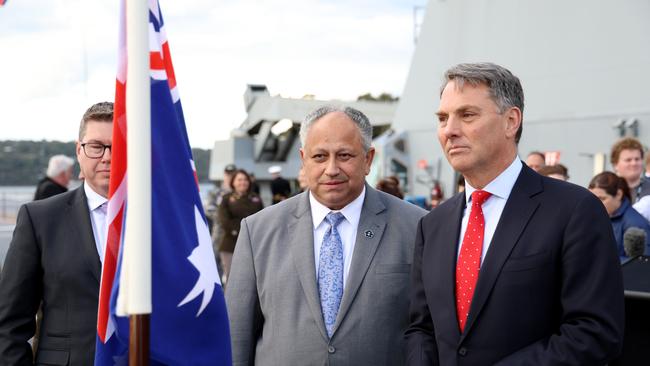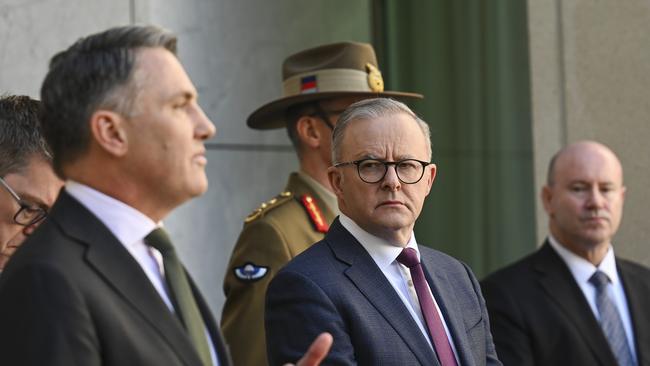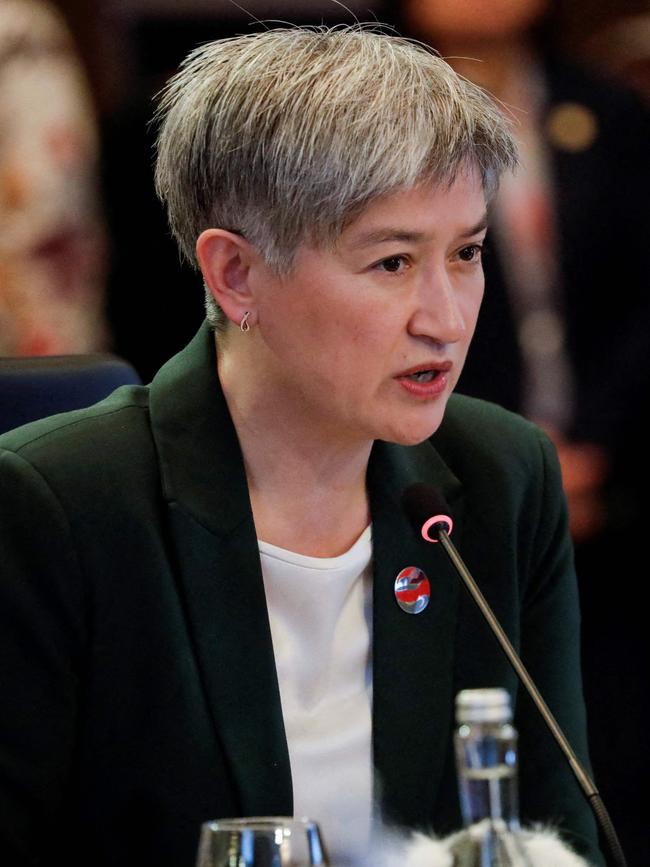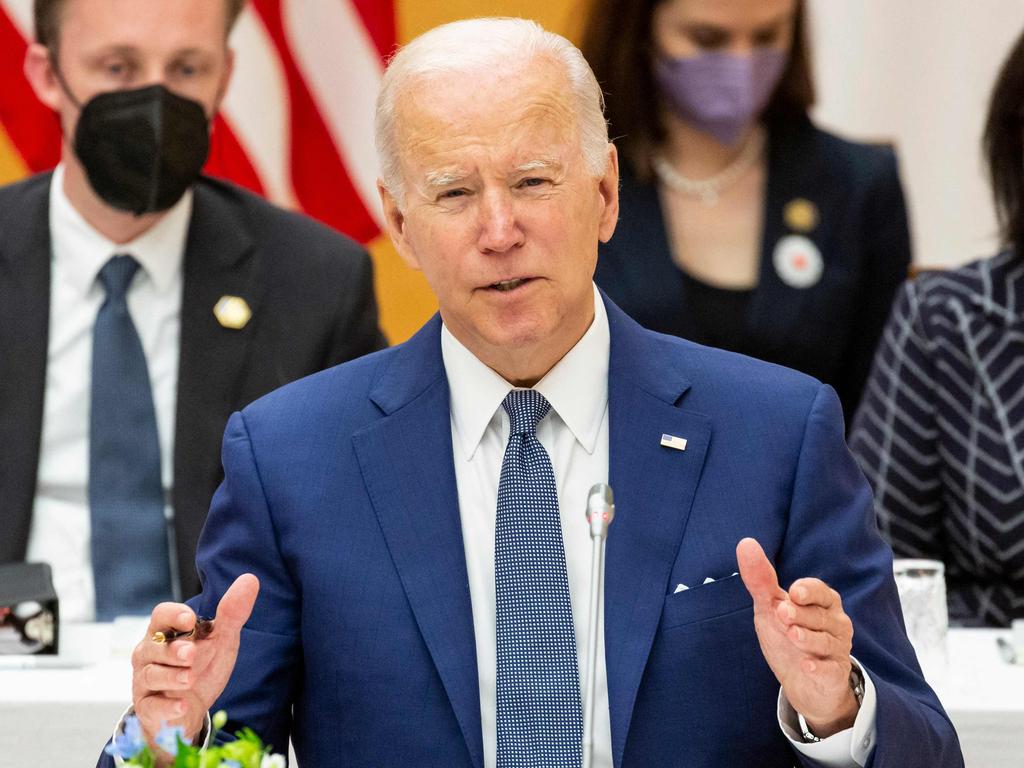
In fact the Australian Defence Force, the Defence Department and Australian defence industry are all in a desperate crisis of cost-cutting and complete confusion about direction, timetable, purpose and everything else.
People are leaving the ADF, especially the army, at a rate of knots and cannot be replaced. The department is going through a frenzy of cost-cutting that is seeing all kinds of capabilities deferred, which often means abolished.
Defence Minister Richard Marles has lost the battle of the budget. It’s not clear he put up any fight. Foreign Minister Penny Wong is a far more powerful cabinet minister. Defence is suffering grievously as a result.
It fills me with pain to write these words. Anthony Albanese promised so much in defence. But this column has a simple policy. It pays on delivery. And the Albanese government, like the Morrison government before it, is so far delivering photo-ops, over-the-horizon vision statements, deft and praiseworthy alliance diplomacy and absolutely no consequential defence capabilities.
Consider the both parlous and chaotic state of defence spending. The budget generally compensates Defence for movements in foreign exchange rates but not for inflation. The Australian Strategic Policy Institute’s budget analysis concludes that the Albanese government, by this mechanism alone, has taken $1.5bn from Defence over the forward estimates, the next four years. In fact it’s worse than that because while the budget was framed at a higher inflation rate than the previous estimates, the actual inflation rate we’ve experienced is higher still, so the real loss to Defence is more than ASPI’s $1.5bn.
Not only that, hundreds of millions of dollars have been reallocated from Defence to other departments, especially the Department of Foreign Affairs and Trade to compensate it for helping to negotiate AUKUS and the like.

This is a scandalous misuse of Defence money and deceptive to the public. If you’re going to use money for other departments, out the money in their budget and own up to your defence cuts.
AUKUS is meant to be a whole-of-government effort. Multiple departments should use their core budgets for it. Instead, the real winner from the Defence Strategic Review is DFAT!
There are times when government passes beyond parody. This recalls the Gillard government deciding to spend part of the foreign aid budget on processing asylum claimants. Thus one of the biggest recipients of Australia’s overseas aid was Australia!
But that’s not anywhere near the end of the bad news. The government claims it has donated $710m of military aid to Ukraine. This column considers that figure is baloney. But let’s take the government at its word. That’s nearly another $1bn straight out of the defence budget.

Defence is in a tremendous panic to cancel everything to pay for the AUKUS subs out of a shrinking defence budget. The only specific military capability arising in the near term from the DSR is the HIMARS rocket launchers for the army. These will initially have a range of 300km but over time will probably get to 500km. That’s a useful capability well worth acquiring. But it does absolutely nothing to provide Australia with any long-range strike or strategic deterrence. That was supposed to come through long-range missiles, swarming drones, long-range fighter aircraft with in-air refuelling capabilities and much else. But we’ve got nothing more than vague promises on that score.

Almost every missile we’re acquiring has been in the works for a long time. The DSR’s biggest capability decision was to cancel the last squadron of F35 Joint Strike Fighters that we had always planned to buy and to defer any consideration of our pitifully underarmed surface fleet to another committee.
All of this is starting to add up to a very dangerous mixture of neglect and poor priorities. The Albanese government will spend its first term in office doing not much in defence but blaming the former Coalition government. I think the former government was indeed abysmal in producing defence capabilities, but the Albanese government is nearly halfway through its first term and has so far done nothing of consequence. Blaming your predecessors is not an effective policy.
Marles made his first big mistake in reappointing the Defence leadership that had produced such dismal performance for so many years. While Marles hasn’t secured the budget outcome these folks would like, it seems he challenges them now on nothing. Opposition defence spokesman Andrew Hastie has proposed a joint parliamentary committee on AUKUS. Previously I was dubious about this because I thought it might reduce political debate on defence. But, as Hastie points out, ASIO, the Australian Secret Intelligence Service and the Australian Signals Directorate actually get more parliamentary scrutiny than Defence does because there is a relevant parliamentary committee overseeing them. The only window we ever get into Defence is Senate estimates three times a year. Apart from that, Defence is effectively beyond scrutiny.

There is grave danger and foolishness in putting all our defence eggs in the AUKUS nuclear submarines basket. Congressional Republicans are holding up authorisation for the technology transfer legislation until Joe Biden agrees to a big increase in defence spending to make sure the US can produce enough nuclear subs for itself. This is normal congressional argy-bargy and is no cause for panic. But it underlines that the AUKUS subs are far from guaranteed.
Donald Trump as president could turn against them. A post-Biden Democrat could be less committed. The next Australian election could produce a Labor administration dependent on Greens or teals for supply, in which case AUKUS is probably cactus. Even if we do get the nuclear subs they are not everything you need for defence.
A government remotely seized of the urgency of our situation would be pushing hard now to establish all manner of real combat capabilities.
The government claimed the defence industry would transform our whole economy yet Defence Industry Minister Pat Conroy is a junior minister, outside cabinet, with another portfolio as well, international development and the Pacific. Both of his portfolios need a full-time minister. The Defence Industry Minister must be in cabinet. Australian defence firms don’t want to get off-side with the government by public criticism, but they are aghast at the lack of action.
This is something like a national emergency, hiding in plain sight right in front of us.








As 30,000 troops join together for the Talisman Sabre military exercises, and as US Secretary of State Antony Blinken and Defence Secretary Lloyd Austin are about to arrive for the annual Australia-US Ministerial meeting, it seems Australia is powering ahead in defence.